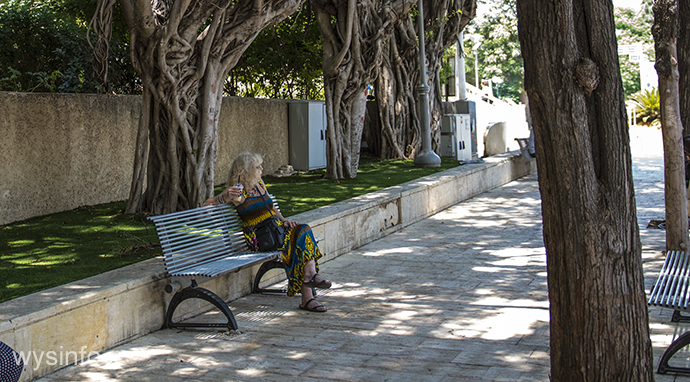This video is part of the ‘All the World is a Stage’ project, initiated by Wysinfo in order to encourage international cooperation through culture.
To watch other performances that are part of this project, follow this link
Wysinfo – ‘All the World is a Stage Project’ Front Page.
Una ora en la ventana – Traditional Ladino / Judeo-Spanish song performed by Tamar Ilana, with Dr Judith Cohen and Yayoi Okaniwa.
Excerpt from the Song (Ladino/Judeo-Spanish and English Translation)
Una ora en la ventana... Ladino (Judeo-Spanish) English Una ora en la ventana
Ora i media al balkon
La kulevra de tu ermana
Ah, no mos desha,
Ah! no mos desha
Azel el amor
Ke komio la tu mama
En preniada de ti
Te kito morena i dulse
Amasada
Amasada kon la miel
Ah! No t’alves ke sos blanka
Blanka komo el yasmin
Ke ay morenikas en mundo
Ke kemoron, ke kemaron
Medio Izmir
Yo la ker, tu la keres
Ya mos vamos a matar
Ven djugaremos a los dados
El ke la gana, el ke la gana
Su mazal
A la mar yo me vo echar
Un peshkado yo vo panar
Siete novias vo kitar
Ah! Yo a ti, yo a ti
Me vo toma
An hour by the window
An hour and a half on the balcony
Your sister, the scorpion,
Oh, she won’t let us, Oh! she won’t let us
Make love
What did your mother eat
When she was pregnant with you?
She delivered you, dark-haired and
sweet
Kneaded, kneaded with honey.
Oh! Don’t be sorry that you are white
White like a jasmine
Because there are brunettes in the
world
Who can burn, who can burn
Half of Izmir
I love her, you love her
We will die together
Come, let’s play dice
The one who wins her,
The one who wins her
Will be the lucky one
I’ll throw myself into the sea
I’ll string a fish
Seven brides I will leave
Oh! You I will, you I will
I will take.
About the song
Una ora en la ventana is a traditional Turkish Ladino / Judeo-Spanish song in which a young man complains that his beloved’s sister, “the scorpion”, is keeping him from his beloved
About the author
Anonymous: Traditional Ladino / Judeo-Spanish song.
Ladino or Judeo-Spanish, known by several other names in different Sephardic contexts, came to be the diaspora language of the Jews descended from the Iberian Peninsula and islands.
Based on the languages they spoke before being expelled in 1492 (Spain) and 1497 (Portugal), especially Castilian, it was used in pre-expulsion Spain as a written language, especially for the translation of religious texts in Hebrew, and included some Hebrew words. Over the years in the diaspora, it also developed as a spoken vernacular, and acquired vocabulary from host cultures.
About the performers
Dr. Judith R. Cohen is a performer and ethnomusicologist specializing in Judeo-Spanish (“Ladino”) Sephardic songs, as well as in medieval and traditional music, including Balkan, Portuguese, Yiddish, and French Canadian, pan-European balladry and songs from Crypto-Jewish regions of the Portuguese-Spanish border. Judith’s performance repertoire and lectures draw on her village field work in several Mediterranean countries and in urban immigrant communities, and on her academic research.
Yayoi Okaniwa is a Japanese Sephardi/Ladino singer and musician. She graduated from the Kunitachi Music College in Tokyo and studied musicology at the Hebrew University of Jerusalem. She performs as a soloist and in numerous vocal and instrumental ensembles of baroque & medieval music as well as traditional Sephardic Jewish music.
Tamar Ilana is a Canadian artist who grew up touring throughout the Mediterranean and North America with her ethnomusicologist mother, Dr. Judith Cohen. By the age of five, Tamar was singing Ladino, Balkan and Medieval music in multiple languages and had already recorded her first album. At eight, she began studying flamenco dance. In 2011, Tamar founded her band, Ventanas, meaning windows in Spanish, reflective of Tamar’s life as a series of windows onto numerous cultures and styles of music, dance and art.
About the location

The video was recorded in the city of Raanana in a private home as part of a home-hosting concept that supports appreciation of cultural activity within a community. This is a growing trend that encourages musical performances in small intimate gatherings.
Raanana is a small city, located in the Sharon area of Israel, just north of Tel Aviv. It was founded in 1922 by a group of New York immigrants. After purchasing the land for a farming venture in 1912, the group from America eventually managed to settle on the land only after the First World War. In the beginning it was an agricultural village and today, it is one of the high tech centers of Israel.
